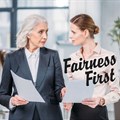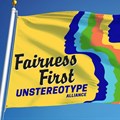#CannesLions2019: CNN's Julia Chatterley on talking pride, Out of the Shadows

The 25-minute documentary, from CNN’s Great Big Story, is the second part of a series that began last year about the struggle of gay P&G employees to win equal rights and benefits in the 1990s. Here, Chatterley talks about how the business environment has changed with regards to LGBTQ rights and explains why there isn't enough marketing budget being spent on the LGBTQ market.
 This is your first time at Cannes Lions. Your views?
This is your first time at Cannes Lions. Your views?
Yes, it is! For me, Cannes is the ultimate celebration of creativity. And for all of us, whether we are in business or in media, I think we know that creativity resonates best when it has a purpose. And perhaps given the political backdrop right now, there has never been a more important time for businesses, for brands to mean something and to resonate to consumers. Perhaps to actually provide the leadership that we're not seeing from politicians.
For me, at a time of great disruption in the industry, it'll be great to see businesses really looking to taking leads.
 This movie Out of the Shadows is so emotional and meaningful. How far do you think the business environment has changed with regards to LGBTQ rights?
This movie Out of the Shadows is so emotional and meaningful. How far do you think the business environment has changed with regards to LGBTQ rights?
I thought it was incredibly emotional. It was almost an airing of dirty linen to some degree for Procter & Gamble to say; look this was a 10-year battle for some pretty inspirational employees. Fighting for basic rights. To be seen, to be ultimately accepted. At a point in the feature children did not have medical insurance but they considered offering it to pets of traditional families. There is something heartbreaking and very poignant about it.
I think we've come a long way and we have a lot further to go, quite frankly, whether that's in terms of integrating employees and making them feel like they belong or actually representing. We're in Pride Month in June, you can buy rainbow cookies and you can buy rainbow trainers - whatever you like, but is there a real translation to protection, embracing rights of the LGBTQ community? I'm not so sure.
When you look around the world and there are more than 70 countries where this behaviour is considered illegal and actually it's not seen as something that is who they are versus a choice or a lifestyle choice. I mean, that is fundamentally wrong. So the journey is ahead of us.
 The world is pretty scary right now. Do you think it’s impacting on these rights?
The world is pretty scary right now. Do you think it’s impacting on these rights?
I think as consumers we're desperate for leadership to some extent. As individuals, there is a lot of hatred and it comes right from the leadership in countries - the embracing of hatred - and I think that's reflected in the abuse of minorities. Whether it's women, whether it's migrants or the LGBTQ community.
 You asked a really important question. Is there enough marketing budget spent on the LGBTQ market?
You asked a really important question. Is there enough marketing budget spent on the LGBTQ market?
There is always going to be these big companies when you're doing something that makes financial sense because, in the end, they are profit maximisers to businesses versus; it's just the right thing to do.
One of the statistics that was given was that the LGBTQ community has a lot of buying power. $4.6tn - the fourth largest economy effectively in the world and the contrast to that is actually that 0.06% marketing budgets are spent targeting them.
There are all sorts of questions. What we've heard is that conversation is, "How do you do that without stereotyping?" And it's not just about this community, it's about how you're not being ageist or youthist, if that's a term. I think the marketing business is struggling with that and identifying that clearly.
This is an industry that is going through disruption. They shifted to digitisation. Consumers behaving differently in the way that they engage. There's a lot going on within this industry and a lot of the money goes to marketing. It goes to Facebook and it goes to Google and it goes to Amazon. And that remains the case. So this industry is dealing with a lot of disruption right now. But these things resonate and the human impact of telling that story is hugely, hugely important. And hopefully, this helps to get the word out.




















